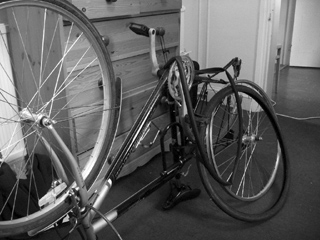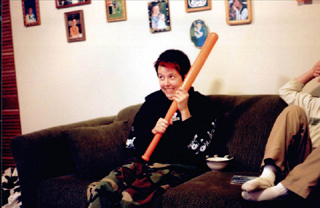A few people have asked me what ‘syndication’ and ‘RSS’ are, so I thought I would write a quick, non-technical introduction.
Syndication intro
The content of this blog can be broadly separated into two types: the text that makes up posts, and all the formatting that surrounds it. What syndication does is take just the text, allowing it to be read through some other site or program than the one usually used to view the site. The big reason why this is helpful is because it lets you quickly check a great many information streams to see if any have changed.
Instead of having to check more than 100 different pages every time I want to see if one has been updated, I can take a look at one page that lists all the different syndication ‘feeds.’
BlogLines
One service that allows this is BlogLines. If you have a look at my BlogLines account, you will see that it tracks more than 100 different ‘feeds.’ These include things as diverse as all the LiveJournal, WordPress, Blogger, and other blogs run by friends of mine; listings of video clips from the Colbert Report and the Daily show; headlines from Metafilter, Slashdot, and other news sites; and a few miscellaneous other things.
If you sign up for a BlogLines account, you can add two different feeds from my blog. Both use a technology called RSS, which stands for ‘Really Simple Syndication.’ The addresses in question are:
Blog posts: http://www.sindark.com/feed/
Blog comments: http://www.sindark.com/comments/feed/
Opening either in a normal Internet Explorer or Firefox window will probably bring up a lot of confusing looking garble. This is the machine readable version of the blog. If you add one of those addresses to your list of feeds in BlogLines, however, you will see a list of recent posts presented, complete with short summaries and links back to the original. Whenever this site (or any other one you have listed) gets updated, it will turn bold on your BlogLines page.
Signing up for the comments feed will allow you to see whenever anybody leaves a comment on any post of mine, without having to check each one individually. I find it a useful way to follow conversations, without having to look at many different individual pages. For people running blogs, it can also be a good way to catch spam.
Firefox live bookmarks
Another way to read RSS feeds is to add them as ‘Live Bookmarks’ within Firefox. This can be done very easily. In Firefox, look over to the right hand side of the blog’s address, inside the white box near the top of the window. On the right hand side, there is a little orange icon with a white dot and radiating arcs. Any page on which you see that icon has a syndication feed available.
If you click that orange icon, a window will pop up asking you to name the bookmark and choose where in your bookmarks menu you want to see it. Then, any time you go into the bookmarks menu and select the name of that site, it will show you a listing of recent post titles. You can click on any of them to go to the post itself.
More information
Bloglines FAQ
WikiPedia on RSS (includes the orange logo I described)
Firefox Live Bookmark tutorial



 Caffeine – a molecule I first discovered as an important and psychoactive component of Coca Cola – is a drug with which I’ve had a great deal of experience over the last twelve years or so. By 7th grade, the last year of elementary school, I had already started to enjoy mochas and chocolate covered coffee beans. When I was in 12th grade, the last year of high school, I began consuming large amounts of Earl Gray tea, in aid of paper writing and exam prep. During my first year at UBC, I started drinking coffee. At first, it was a matter of alternating between coffee itself and something sweet and delicious, like Ponderosa Cake. By my fourth year, I was drinking more than 1L a day of black coffee: passing from French press to mug to bloodstream in accompaniment to the reading of The Economist.
Caffeine – a molecule I first discovered as an important and psychoactive component of Coca Cola – is a drug with which I’ve had a great deal of experience over the last twelve years or so. By 7th grade, the last year of elementary school, I had already started to enjoy mochas and chocolate covered coffee beans. When I was in 12th grade, the last year of high school, I began consuming large amounts of Earl Gray tea, in aid of paper writing and exam prep. During my first year at UBC, I started drinking coffee. At first, it was a matter of alternating between coffee itself and something sweet and delicious, like Ponderosa Cake. By my fourth year, I was drinking more than 1L a day of black coffee: passing from French press to mug to bloodstream in accompaniment to the reading of The Economist.